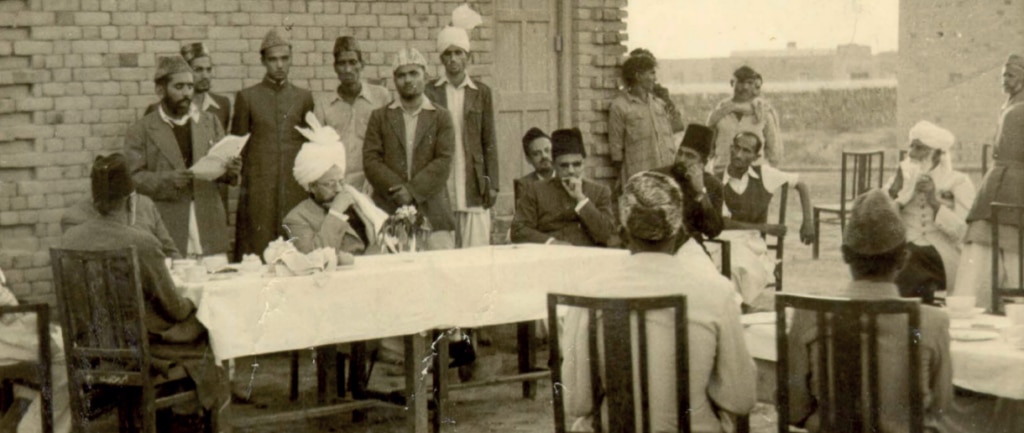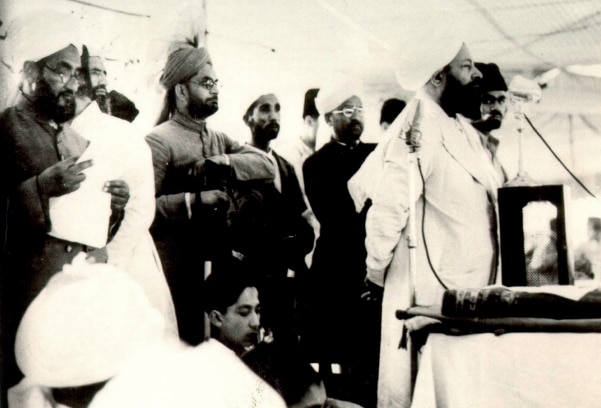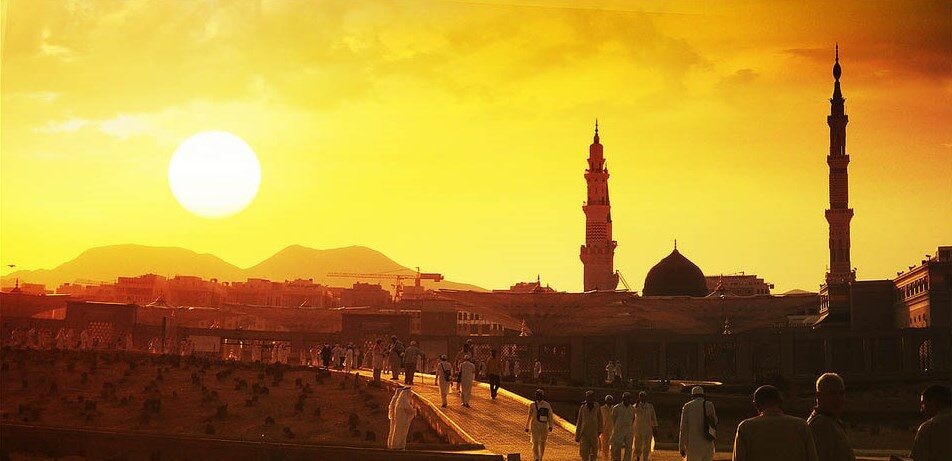Al Fazl, 27 March 1922

27 January 1922
Sunnah [practice of the Holy Prophetsa]
A friend asked if it was the sunnah [of the Holy Prophetsa] to use surma [kohl powder applied to eyes].
Hazrat Khalifatul Masih [IIra] said:
“As far as the sunnah [practice] of our country is concerned, [applying surma is a sunnah of our country]. People have interpreted the sunnah in strange ways. I saw in Hyderabad that a man was eating rewris [a crunchy sesame sweet] with great relish. When I asked him, he said that it was a sunnah because the Promised Messiahas used to eat them. Hence, sunnah has been given broad meanings.
“The true meaning of the sunnah is that [practice of] the Holy Prophetsa which was regarded worthy of reward by him. Moreover, there also are some deeds which can be called [acts] of expressing admiration, such as the deed of Abdullah Ibn Umarra […] when he would reach the place where the Holy Prophetsa once wiped his shoes, he would do the same, or where the Holy Prophetsa reclined, he would also recline there. These deeds are acts of love.
“On the other hand, there are some things that are national customs. For example, the Holy Prophet’ssa dress was Arabian, so it is not necessary that everyone wears the same dress. The Promised Messiahas wore Indian clothes, not Arabian ones, and he also said that the Holy Prophetsa used to wear a turban as well.
“Then there are some things that are naturally good [for someone]. For example, gourd – the people keep saying that it is the sunnah [of the Holy Prophetsa to eat gourd], but when it is against their nature, they stop [eating it]. The Holy Prophet also wore pajama [loose trousers], but this does not mean that the exact same should be worn; it means that a clothing similar to it should be worn because trousers are also a kind of pajama, so should it be considered against the sunnah?”
During the above discussion, Huzoor[ra] gave an example and said:
“The Promised Messiahas once wore gurgabi [a kind of soft shoe or moccasin] but the pair would get interchanged. Consequently, red and yellow threads were tied [to the respective pair of shoes to differentiate them]. Then, a faithful servant came, he saw that someone had in that way disgraced the gurgabi of the Promised Messiahsa, so he untied the threads. When the threads were untied, the Promised Messiahas could not recognise his gurgabi; rather, he said that they was not his because his had threads on them.
“Eventually, the Promised Messiahas could not wear the gurgabi for long. It seems that the feet of our family are very soft by inheritance.”
Hypothetical sketch of life after death
Hazrat Khalifatul Masih[ra] said:
“The people of Europe have drawn a strange sketch of life after death. They make their plans [for the next world] in advance. Yesterday, a newspaper quoted a British minister, Mr Churchill, as saying that he would go to Paradise after his death and he would spend the first million years photographing because there was still a great deal of research left to be carried out in the field of colours. Mr Churchill’s desire is like that of a child; if a child is told to be taken to God, he would also say, ‘Okay! Let’s go, I will take toys from God.’”
“The people of Europe object to the views of others, such as pull-e-siraat [a bridge over which the righteous ones will pass into Paradise and the wicked ones will fall into Hell on the Day of Judgment] or the blessings of Heaven, etc., but they themselves say such things.”
After the Friday prayer, the following friends took bai‘at:
1. Chaudhry Lal Din, Kalu Sohal, Gurdaspur
2. Shahnawaz, Poonch
3. Abdul Ghani, Malsian, Jalandhar
4. Alif Din, Azori, District Iasi, Jammu
5. Faqir Muhammad, Azori, District Iasi, Jammu
6. Qaimuddin Sahib, Poonch
7. Ali Muhammad Sahib, Dalla, District Gurdaspur
8. Faqir Sahib, Dalla, District Gurdaspur
9. Kamaluddin Sahib, Dalla, District Gurdaspur
10. Haider Sahib, Dalla, District Gurdaspur
Mention of the Pope
On the mention of the Pope’s death, Hazrat Khalifatul Masih[ra] said:
“Due to the Pope, there is a strong religious passion in Roman Catholics. I am surprised that the rich among the Muslims do not have a passion for religion. The Pope has a higher status than many Muslim kings, despite being a religious man. The person who gets rich among the Muslims forgets about the religion.”
Then, regarding the method of the election of the Pope, Hazrat Khalifatul Masih[ra] said:
“The 64 cardinals elect one as the Pope from among themselves. The Pope who has passed away was considered lower in status. There was a dispute after the death of the previous Pope, but since there was no disagreement over the next one, all the parties were in agreement about him. There is a famous saying among them that whoever considers himself a Pope returns as a priest and whoever considers himself a priest returns as a Pope.”
5 February 1922

The meaning of the verse:
فقد لبثت فِيۡكُمۡ۔۔۔
In the midst of a discussion, Hazrat Khalifatul Masih [IIra] said:
“People do not understand the meaning of this verse:
فَقَدۡ لَبِثۡتُ فِيۡكُمۡ عُمُرًا مِّنۡ قَبۡلِهٖ
“[‘I have indeed lived among you a whole lifetime before this.’ (Surah Yunus, Ch.10: V.17)]
“This means that ‘My [i.e. the Prophet’s] life was a model and people followed me even when I was not a prophet and respected me considering me a distinguished person.’ If this is not the meaning [of this verse], then it would mean that no matter how insignificant a person may be and the people may not have paid any attention to him, he can still call himself a prophet on that basis.
“In many cases, people do not pay attention to anyone, and if there is any attention given, they eventually just ignore him considering him untruthful.”
Biography of the Holy Prophetsa
Hazrat Khalifatul Masih[ra] said:
“People have not understood the reality of prophethood. If they start to praise it, they give it the status of Godhood. On the other hand, if they lower it, they consider its [status] as that of a simple nobleman or a numberdar. For example, it is said that the Holy Prophetsa did not lie or commit robbery, but the fact of the matter is that no noble man lies or commits robbery. Actually, what should be emphasised is that according to his claim of prophethood, he had such and such extraordinary attributes.
“My heart always yearns that the biography of the Holy Prophetsa should be written in such a way that when a reader studies the said book, they should immediately come to the conclusion that he was a prophet, a messenger or the Seal of all the Prophets. However, the biographies that have been written so far prove that the Holy Prophetsa was a good king or a successful person. It is imperative that his attributes in accordance with his claim be presented in the said books. For example, when biographies of Napoleon, Wellington or Clive are written, since these people were good generals or good administrators, the author will describe their characteristics which will make a person decide whether or not the particular person was a general or an administrator. In the same way, the writer of the biography of the Holy Prophetsa should show the glory of his prophethood.
“I don’t have time [to write such a detailed biography], but I have drawn the attention of several people acquainted with English language towards it.”

Bai‘at
The following two individuals took bai‘at:
1. Khushi Muhammad, Ohama, Shahpur
2. Rahman, Ohama, Shahpur
13 February 1922
Bai‘at
1. Abdullah Baig Sahib, Banda, District Hazara
2. Ilm Din Sahib, Deriwala, District Gurdaspur
14 February 1922
Maulvi Muhammad Ali Sahib’s belief about kufr [disbelief] and Islam
Maulvi Muhammad Ali Sahib wrote that Imam Abu Hanifarh believed that when one said لا الٰه الّا اللّٰه, then whether he disbelieved or did shirk [attributing partners with Allah], he could not be considered a disbeliever.
When this was mentioned, Hazrat Khalifatul Masih [IIra] said:
“The example of a person who mistook a bear for a blanket would come true for Islam in the above case. The bear grabbed him and when it took him too long, his friend told him to leave it if he could not pick it up. The man replied, ‘I want to leave the blanket, but the blanket does not leave me.’
“In the same way, according to the said belief, it is as if Islam has grabbed hold of someone and cannot let go of him, no matter what that person does.”
15 February 1922
What kind of scholars do we need?
On the mention of the fact that our scholars do not know English and those who know English do not know Arabic or Persian in general, Hazrat Khalifatul Masih[ra] said:
“If we want to conquer the Middle East and the Near East, we need men who are acquainted with Arabic-English and Persian-English.”
17 February 1922
Bai‘at
1. Shah Wali Sahib, Kund, Kashmir
2. Imamuddinn Sahib Arain, Nangal, near Qadian
3. Fazluddin Sahib Kumhar, Qadian, District Gurdaspur
4. Fazal Haq Sahib, son of Fateh Ali Sahib, Dhoke Jamma, District Jhelum
(Translated by Al Hakam from the original Urdu in the 27 March 1922 issue of Al Fazl)

